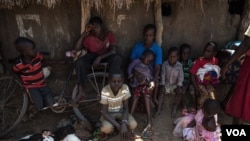In the Meri refugee camp in the Democratic Republic of Congo, more than 30,000 South Sudanese refugees yearn to return to their homeland, which has been ripped apart by a four-year civil war.
The new cease-fire signed Thursday between the government of President Salva Kiir and different rebel groups should raise hopes of peace in the war-torn country.
But the refugees in Meri camp who spoke to VOA said they are not celebrating just yet.
"We hear, but we don't know whether it is going to be," said Rose Tabu, a 20-year-old mother of one who came to Congo last year to escape fighting. "We just leave it in God, since last time we hear 'peace peace peace,' but there is not peace."
The cease-fire stipulates the two sides must stop military activities, allow access for aid groups, and uphold the laws of war, including not committing atrocities against civilians.
Lilias Arie, 24, urged the warring parties to stop targeting civilians. She said government soldiers had attacked civilians, while the rebel group led by former vice president Riek Machar, called the SPLA-IO, had stolen property.
"Since the fighting is between the IO and the government soldiers, why are they killing civilians, harassing civilians, even burning houses, why?" Arie said. "Let them not kill civilians. Salva should tell his soldiers to not kill civilians. And Riek should come to the table to find a solution to this war."
Lino Lasuba, 32, said he did not have high hopes because many previous cease-fires have fallen apart.
"Of course, this is not the first signing of peace in South Sudan, several peace [deals] have been signed, so at the end of the day, what we expected changed to be the contrary," Lasuba said.
As the cease-fire goes into effect Sunday, South Sudanese refugees in Congo will be watching closely to see if peace will hold — and whether they can finally return home.
